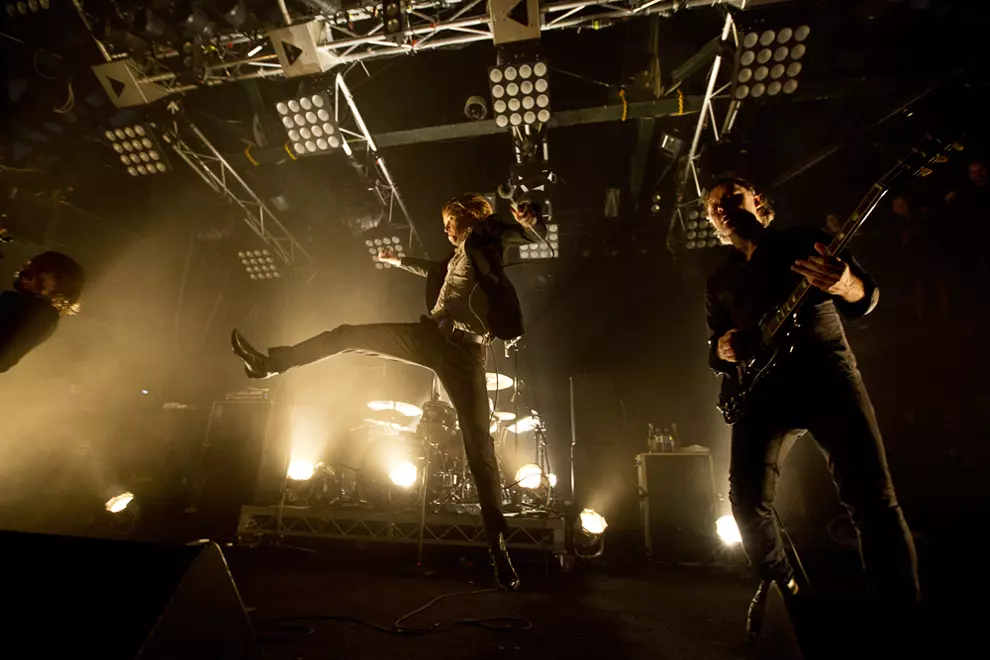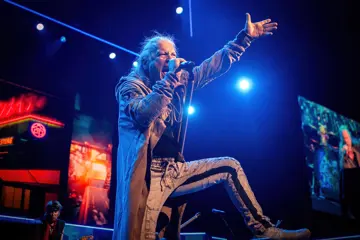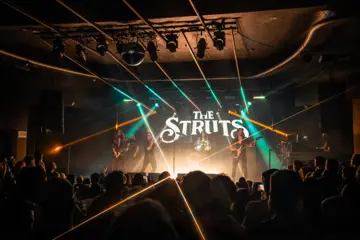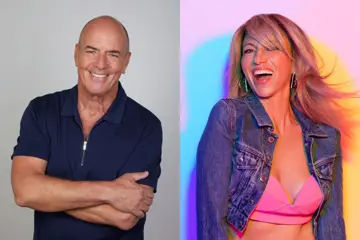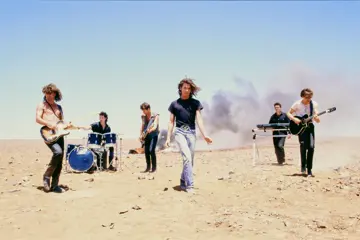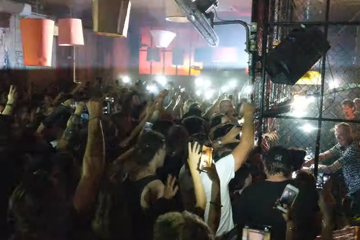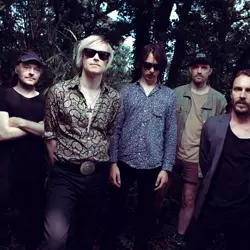 Refused
RefusedA few weeks ago, Swedish punk band Refused posted to social media about their summer festival bookings. “We found out that some of the festivals we’re playing this summer are backed by an entertainment conglomerate called Superstruct in which a bad actor named KKR is part owner,” they wrote.
KKR is a US-based private equity company with a large portfolio of investments in Israel, including in cybersecurity, software, data and information technology. Twelve months ago, KKR acquired the UK-based Superstruct Entertainment for €1.3 billion.
Superstruct is the world's second-largest festival promoter, owning more than 80 events across Europe and Australia. Along with Budapest’s Sziget and Oslo’s Øya, whose 2025 lineups both include Refused, Superstruct owns Germany’s Wacken Open Air, Barcelona’s Sónar and London’s Field Day.
Closer to home, Superstruct owns Fuzzy, which presents Sydney’s Harbourlife and Field Day festivals, and the annual touring event Listen Out.
In their statement, Refused said they initially wanted to “jump ship, to boycott.” But the festivals pushed back, telling them their audiences would likely be “sympathetic” to the band’s anti-colonial, pro-Palestine position.
Don't miss a beat with our FREE daily newsletter
Ultimately, Refused decided not to boycott the festivals, preferring to use their place on the lineup to “make noise” for the Palestinian cause. “Some Swedish leftists sitting out a few festivals wouldn’t raise many eyebrows,” they wrote.
In May, an article in the Dutch newspaper NRC revealed that leading genocide scholars from around the world – including Israel, the USA, UK and Australia – are unanimous in their view that Israel’s campaign of bombing and starvation in Gaza constitutes the crime of genocide. Human rights organisations such as Amnesty International, Human Rights Watch and B’Tselem have all condemned Israel for committing the crime of apartheid against Palestinians.
Israel has repeatedly denied it is committing genocide in Gaza, including late last year, when Human Rights Watch and Médecins Sans Frontières accused Israel of genocidal acts and ethnic cleansing in the territory, as reported by SBS News.
So, while Refused’s rationale has a veneer of political pragmatism, it ignores the validity and efficacy of boycott movements.
What is a boycott, and do they work?
Boycott, Divestment, Sanctions (BDS) is a Palestinian-led movement that launched in 2005 with the goal of securing the basic rights needed for Palestinians to exercise self-determination.
To achieve its goals, BDS targets corporations, organisations and institutions that do business with the state of Israel. “The most important point about BDS is that it connects the Palestinian liberation struggle with ending complicity internationally,” BDS founder Omar Barghouti told Al Jazeera English. “In order to effect policy change, we need to build people power,” he said.
BDS was inspired by the South African anti-apartheid movement, which not only led to South Africa’s exclusion from international sporting competitions such as cricket and rugby but also saw South African musicians blocked from BBC radio and led to a large majority of musicians refusing to perform in the apartheid state.
The cultural boycott is not solely responsible for bringing down South Africa’s apartheid regime, but it undeniably played a role in the system’s collapse, according to The Guardian’s former South Africa correspondent, Chris McGreal.
This historical precedent has motivated dozens of musicians to boycott Superstruct-owned festivals across Europe in recent months. More than 50 artists boycotted Sónar, a major dance music festival in Barcelona that took place over the second weekend of June.
The boycott was led by the BDS-affiliated Palestinian Campaign for the Academic and Cultural Boycott of Israel (PACBI), which called on Sónar to “publicly oppose KKR's complicit investments” and to end its sponsorship deals with Coca-Cola and McDonald's, both BDS priority targets.
After much pressure from PACBI, the festival ended its deals with Coca-Cola and McDonald's, but KKR’s ownership of Superstruct proved a sticking point for many artists, including Palestinian DJ Samaʼ Abdulhadi. “I cannot and will not be associated with festivals or institutions backed by KKR which means I will not be performing at Sonar Festival this Friday,” she wrote.
The Sónar boycott followed major backlash against London’s Field Day, which took place in May. An open letter was published in April, signed by Brian Eno, Massive Attack’s Robert Del Naja and 230 others, calling on Field Day to “publicly distance itself from KKR to the fullest extent it possibly can.”
Nearly a month later, and after more than 15 acts had pulled out of the festival, Field Day addressed its controversial ownership. “[We] had no knowledge or influence in KKR’s investment in Superstruct last year,” they wrote. “We are passionately opposed to KKR’s unethical investments in Israel.”
The event went ahead – and it was a sell-out – but Field Day announced it would be sending £50,000 of “funds released due to the artist withdrawals” to two charities providing aid in Gaza: Médecins Sans Frontières and World Central Kitchen.
What’s been happening in Australia?
A similarly motivated boycott campaign was mounted against this year’s Vivid Sydney festival, which is owned by the New South Wales government agency Destination NSW. Artists such as Kaiit, Soju Gang, Miss Kaninna and Setwun signed an open letter from Sydney-based activist group Stop the War on Palestine, calling on Vivid Sydney to drop Airbnb as a sponsor.
Airbnb – Vivid Sydney’s Community Partner and the sponsor of its Volunteer Program – is a BDS target due to allowing accommodation listings in the illegally occupied West Bank. According to an investigation carried out by The Guardian, as of August 2024, there were 350 listings on Airbnb across the occupied West Bank, including occupied East Jerusalem.
“Any company doing business in Israel’s illegal settlements is enabling a war crime and helping to prop up Israel’s system of apartheid,” Amnesty International UK’s crisis response manager, Kristyan Benedict, told The Guardian.
The artists’ open letter accused Vivid Sydney, by virtue of its partnership with Airbnb, of being “complicit in normalising the illegal occupation of Palestinian land and ‘art-washing’ Israel’s crimes.”
The campaign was unsuccessful: there remains a whole page dedicated to Airbnb on the Vivid Sydney website. But some acts decided to take matters into their own hands. In a statement titled “We Don’t Need Vivid, and We Don’t Need Airbnb,” artists including Sleep D, Andy Garvey, Moktar, Ben Fester and Wax’o Paradiso announced they had cut ties with the festival and its sponsor Airbnb.
These artists were set to perform across two events at Carriageworks on June 7 and June 14. The events were not cancelled, but went ahead without the backing of Vivid Sydney and Airbnb.
Garvey, a Sydney-based DJ and the brains behind the electronic music label Pure Space, told The Music that the artists made the decision to distance themselves from Vivid Sydney due to the festival’s partnership with Airbnb.
“I’m hopeful that our actions alongside others will push Destination NSW to reconsider its stance on working with companies complicit in ongoing human rights violations,” Garvey said. “Artists have power when we move together, and this moment has shown how essential that solidarity can be.”
As one fan wrote in response to the Refused’s lapsed radicalism: “It’s not about awareness. It’s about impact at this point.”

